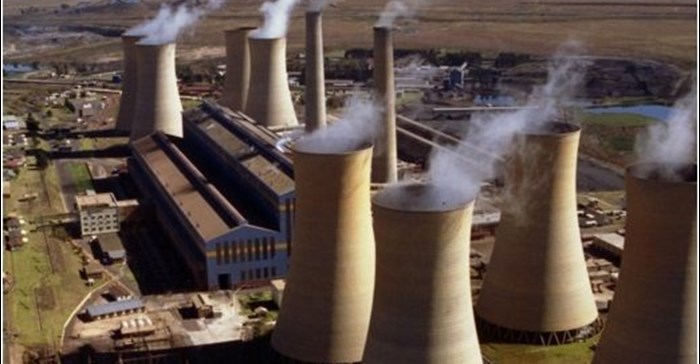In March, Eskom announced plans to shut down five of its oldest coal-power plants. The dramatic nature of the announcement was a cynical move: the decommissioning of Komati, Kriel, Camden, Grootvlei and Hendrina power plants has been scheduled (by Eskom) for a long time, as these plants come to the end of their technical and economically feasible lives.

Komati Power Station. Photo: Eskom
It appears the real reason for the announcement was Eskom's attempt to garner trade union support for its audacious refusal to sign renewable power purchase agreements by claiming, falsely, that capacity from renewable energy was forcing the early closure of Eskom stations.
Before this announcement, Eskom had declared its intention to do a feasibility assessment for refurbishment of these plants: a self-evidently unaffordable and unnecessary exercise that now appears to have been abandoned. More recently - and apparently as a result of the protests by unions - it also said it would assess the socioeconomic effects of closing down the plants. But that process does not seem to have started either.
All this manoeuvring raises questions about why Eskom is so intent on continuing to purchase coal, and to purchase it from particular suppliers, when, quite apart from the devastating environmental and health effects, coal power is no longer the cheapest way to generate electricity.
Renewable energy, particularly from the later rounds of procurement - including those agreements Eskom is unwilling to sign - is cheaper. At this stage, it seems hard to escape the conclusion that Eskom is selling power to South Africans that is more expensive than it should be to maintain vested interests in the coal-mining industry.
One Eskom issue that has received barely a mention in the public domain is that it is SA's single biggest polluter. Its old, dirty coal-power stations are not only violating the Constitution and environmental laws, but are also killing South Africans every day.
In 2015, despite vehement civil society opposition, the national air quality officer granted Eskom postponements from compliance with air emission standards that seek to protect health. This unforgivable capitulation effectively allowed Eskom's stations to continue to pollute beyond prescribed acceptable standards of emissions for another five, and in several cases, 10 years.
Before these postponements were granted, civil society and community groups told the government that experts advised that more than 2,200 premature deaths were already being caused each year by the air-pollution emissions from Eskom's coal-fired power plants including the deaths of 200 young children. These and other health effects from Eskom emissions were then estimated to cost SA R30bn each year.
We also showed the government that granting the postponement would mean that the excess emissions would cause, over the life of the power plants, approximately 20,000 premature deaths. The economic cost associated with the premature deaths and the neurotoxic effects of mercury exposure was conservatively estimated to be at least R220bn.
These are the estimated health effects that the government knew about in 2015, when it granted Eskom permission to continue to pollute in excess of the legal limits. Eskom was also well aware of the significant health effects, having conducted its own assessments in 2006.
Eskom therefore has licences that allow its power stations to emit pollutants that cause ill-health and kill thousands of South Africans every year. And yet it appears that Eskom is not even complying with those relaxed licence conditions. Expert analysis of records secured from Eskom via access to information requests reveals that at least seven Eskom power stations - Duvha, Grootvlei, Kendal, Komati, Kriel, Matla, Lethabo - were probably noncompliant with their PM10 (small fractions of dust) licensed limit values in 2015-16. This evidence will be presented by affected communities and civil society organisations to the Department of Environmental Affairs for urgent investigation and enforcement action.
Like many other countries, SA needs to move beyond coal and urgently needs a comprehensive, intradepartmental plan to mitigate job losses and to prepare workers in the coal-power and coal-mining industries for transition into other sectors including the restoration of the ecological functioning of the Mpumalanga Highveld.
However, putting an end to the pollution from Eskom's coal-power plants is not up for political debate or negotiation. Ensuring an environment that is not harmful to health or wellbeing is a fundamental human right and a constitutional obligation.
Making decisions that have the effect of making thousands ill or causing their premature deaths is unconstitutional and immoral. It is also unacceptable for a country that claims to be a regional leader.
The Treasury, the Department of Energy, the Department of Environmental Affairs and Eskom should have regard to the real risk of constitutional litigation to force them to implement the expensive measures required to stop the pollution that is causing the air breathed on the Highveld and in the Vaal consistently to exceed health standards. The third air pollution priority area, the Waterberg-Bojanala, looks likely to suffer the same fate.
These decision-makers should not ignore the possibility of affected communities on the Highveld and in the Vaal instituting class action proceedings against Eskom for the devastating effects with which they are living and of which they are dying.




































